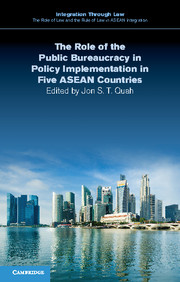Book contents
- Frontmatter
- Contents
- List of tables
- List of contributors
- General editors’ preface
- Preface
- 1 The role of the public bureaucracy in policy implementation in five ASEAN countries: a comparative overview
- 2 Weak central authority and fragmented bureaucracy: a study of policy implementation in Indonesia
- 3 The public bureaucracy's role in policy implementation in Malaysia
- 4 Dysfunctional bureaucracy, corruption and weak rule of law: a case study of policy implementation in the Philippines
- 5 Governance and meritocracy: a study of policy implementation in Singapore
- 6 Vietnam's public bureaucracy and implementation of two ASEAN policies
- 7 Policy implementation in ASEAN and the European Union: the problem of asymmetric compliance
- Executive summary
- Index
- References
6 - Vietnam's public bureaucracy and implementation of two ASEAN policies
Published online by Cambridge University Press: 05 February 2016
- Frontmatter
- Contents
- List of tables
- List of contributors
- General editors’ preface
- Preface
- 1 The role of the public bureaucracy in policy implementation in five ASEAN countries: a comparative overview
- 2 Weak central authority and fragmented bureaucracy: a study of policy implementation in Indonesia
- 3 The public bureaucracy's role in policy implementation in Malaysia
- 4 Dysfunctional bureaucracy, corruption and weak rule of law: a case study of policy implementation in the Philippines
- 5 Governance and meritocracy: a study of policy implementation in Singapore
- 6 Vietnam's public bureaucracy and implementation of two ASEAN policies
- 7 Policy implementation in ASEAN and the European Union: the problem of asymmetric compliance
- Executive summary
- Index
- References
Summary
Introduction
This chapter examines the formulation, implementation and monitoring of policies by the public bureaucracy in Vietnam. It presents a discussion of the main features of Vietnamese public bureaucracy and its recent evolution arising from the promulgation of the Law on Civil Servants and Public Officials. It describes the hierarchically structured process of policy formulation, which involves a monolithic process of discussion and deliberation among the policy-makers. While there is formalistic cohesion among the policy-makers after policy formulation, there are bottlenecks in policy implementation and policy monitoring because of dispersion among public officials and civil servants, their limited capacities and the prevalence of patronage and nepotism in the Vietnamese public bureaucracy.
The processes of policy implementation in Vietnam have been characterized by some scholars as ‘purposively complicated’ and ‘frequently unclear and overlapping’ (Gainsborough, Dang and Tran 2009; Gainsborough 2010), ‘gloomy with a large gap between intention and implementation’ (Fritzen 2005) and ‘manifold and dispersed’ (Woodside 2006; Acuña-Alfaro 2009a).
This chapter is divided into five sections. The following section focuses on the policy context and identifies the salient features that influence policy formulation and implementation in Vietnam. The second section provides background information on Vietnam's public bureaucracy and describes its ‘waved’ approach to reform and implementation. The third section discusses the distinctions between public officials and civil servants in Vietnam. The fourth section looks into recent efforts to differentiate and develop a more meritocratic system in order to enhance policy implementation.
The fifth section focuses on the challenges of linking policy intention with implementation by presenting two case studies which continue the analysis in the previous sections regarding the role of the public bureaucracy in policy implementation. These case studies examine the processes related to policy implementation by the public bureaucracy in Vietnam and identify a hierarchically structured and formalistic process of policy formulation. However, given the dispersed network of public officials and civil servants and their limited skills and capacities, policy implementation and policy monitoring are found to be bottlenecks.
Policy context in Vietnam
Vietnam has a land area of 331,114 sq. km and borders the Gulfs of Thailand and Tonkin as well as the South China Sea (The Economist 2013: 240). It also shares boundaries with China, Laos and Cambodia. It has an s-shaped figure with a coastline of 3,260 km.
- Type
- Chapter
- Information
- Publisher: Cambridge University PressPrint publication year: 2016
References
- 5
- Cited by



